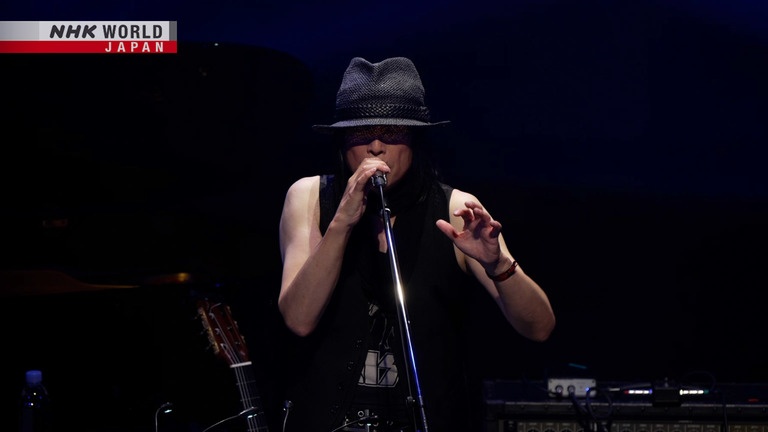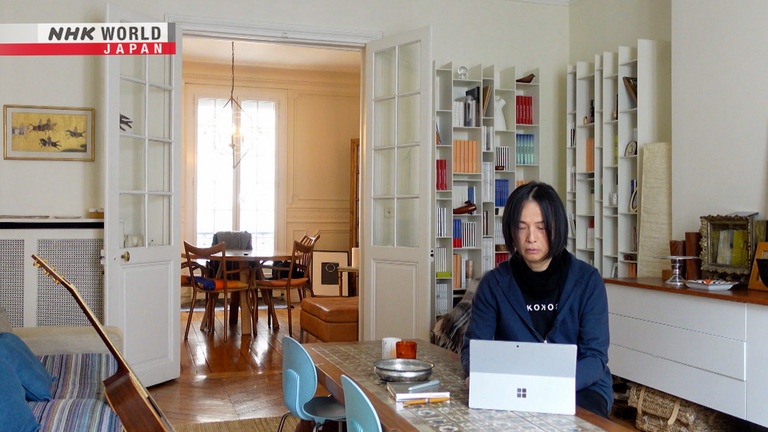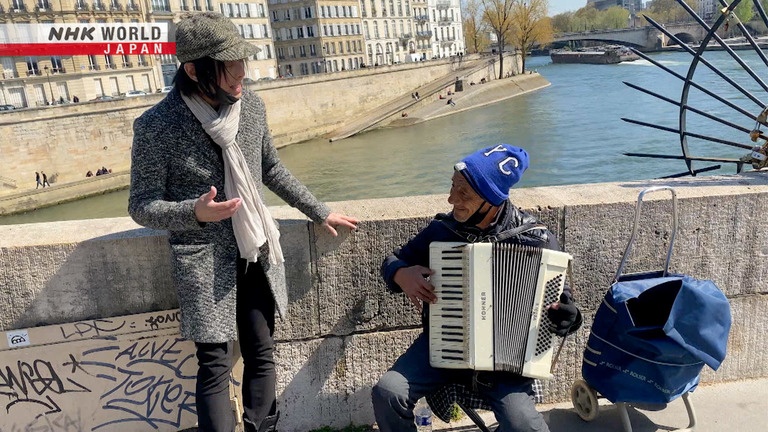Tsuji Hitonari: A Life Devoted to Exploring Art
Tsuji Hitonari is an author, poet, musician, director, performer, chef and more. In the 1980s, he led Japan's rock scene while writing novels. 20 years ago, he moved to Paris, where he has been pursuing various interests, including cooking and blogging. This year, he played at the famed Olympia in Paris, kicking off a tour of France and Japan. He's also just released a film he wrote and directed. Tsuji shares his unique perspective on the world.



Transcript
Today's guest is Tsuji Hitonari.
This summer, he held live concerts in Paris and throughout Japan.
Each concert was packed with attendees.
He made his debut in 1985 as the frontman of the rock band ECHOES.
While leading Japan's rock scene, he relocated to France in 2003.
People shouldn't treat music and
literature as separate things.
Doing so makes the world smaller.
I'm the one person fighting back.
I keep doing it all.
He has also written various novels and stories,
and has received literary awards in both Japan and France.
He's also adapted and directed films based on his novels.
He also cooks!
Just who is Tsuji Hitonari?
We explore the many facets of his creativity on today's Face to Face.
Tsuji led legendary Japanese music group ECHOES from 1985-1991,
after which he began focusing on his work as a solo artist.
His song "LATATA" was inspired by his creative work in Paris.
Critics attribute Tsuji's success to a distinctive Western pop sound and his passionate lyrics.
- Hello.
- Nice to meet you.
I've read several of your short
stories and full-length novels.
I've been closely following
your writing career.
I heard your live performance for
the first time. It was amazing.
You were like a chameleon.
What struck you the most?
You started out with songs like "Zoo"
and "Alone" from your former band.
I remember them from back then.
Then you began changing the tone and
color of your voice, so impressive.
I've been doing this for
nearly 40 years now.
My voice reflects changes in
my muscles, bones, and throat.
I want to merge with the audience.
To share my thoughts and ideas.
But it all comes from my body,
my stance.
The finale was a take on Taki Rentaro's
"Moon Over the Ruined Castle."
I tried to convey its atmosphere
by making my voice and body tremble.
The Japanese song "Moon over the Ruined Castle" came out in 1901.
Tsuji's interpretation of the castle's rise and fall struck a chord with audiences.
"A banquet held in the castle high above."
"Warriors drinking under cherry blossoms."
"Their cups reflect the moonbeams
through old pine branches."
"Where is the moonlight now?"
It sounded very mysterious,
much like Mongolian throat singing.
It felt like you infused the Japanese
song with a Mongolian spirit.
I made use of a fast vibrato.
In France, I often listen to chansons
by Edith Piaf and others.
So that's probably how I learned
to sing this kind of vibrato.
I also went to Seville in southern
Spain to study guitar techniques.
Spanish flamenco.
I wanted to evolve away
from my start in 8-beat rock.
I focused on classical guitar.
I didn't want to be limited
by needing to plug into an outlet.
That goes against the essence
of my music.
I want to be able to play
my songs for anyone, anywhere.
I just need to play guitar
and percussion on my own.
So you played on
the street in France?
Yes, I started on the street,
and the banks of the Seine.
There I met many musicians,
which led to forming a band.
A violinist from North Africa
and a percussionist from Brazil.
I played with great musicians,
many of whom were headliners.
We even got to play at
the famous and historic Olympia.
We presented a mix of music including
African and Romani elements.
Was that a turning point for you
as a musician and performer?
In Japan, I played huge arenas,
toured with a team of roadies.
In my 20s and 30s, playing
for packed venues was normal.
But in France, I was a nobody.
I didn't even sing in French.
I rediscovered the heart of music.
A great street musician has
the power to bowl you over.
Music's nothing like literature,
or politics, or economics.
It touches our hearts directly.
Music gets you right in the gut.
It's visceral.
It captures you.
It's an ongoing process
of trial and error.
My street performance
evolved over 20 years.
I don't use sheet music. I want it
to be free, without a frame.
So I improv as I like and
rely on my band to stay with me.
We randomly take turns soloing.
Live performance is an art form.
You're a literal part of it.
Prepare for the chemical reaction
with your audience. Enjoy it.
We're all playing by ear on stage.
We're trying to find the moment
when everything comes together.
When it does, it's indescribable.
Connecting through music is such
a thrill. Literature, too.
That perfect moment when
physicality and philosophy merge.
That's what it's all about.
- You have a concert in London soon?
- Yes, you're invited!
That's quite a gamble, isn't it?
Going from Paris to London?
There's much to discover
outside of English-speaking culture.
People are finally
becoming aware of this.
If I show the truth of what I do
and who I am, they'll accept me.
Tsuji's fans have long awaited his return to Japan.
Today's fan meeting was organized by a food magazine
which has been running a monthly essay by Tsuji for four years.
Living through food is vital, right?
I've lived in Paris for 20 years.
Me, my kid, my dog: we all keep
eating. I'm passionate about food.
Tsuji himself came up with the menu for the event.
In his mid-40s, Tsuji began searching for a place where he could give free rein to his creativity.
He ended up moving to Paris.
- I'm making couscous today.
- Sounds great.
- How about some zucchini?
- Oh, definitely.
These are from Provence.
They're quite firm.
Tsuji began cooking for his son after getting divorced.
But today, cooking has become a source of inspiration for him.
- Hey, dinner's ready.
- Coming.
In 2016, Tsuji began blogging about his life in Paris.
He shared his creative activities as well as his takes on cooking and parenting.
Cooking in Paris.
Here we go. Ready?
The blog garnered a following, resulting in a Japanese TV series about his life in Paris.
I'm living with music, writing,
and art on a daily basis.
It makes me happy to be alive.
It seems that music and cooking
have a lot in common.
Cooking for my kid, and a standing
ovation for singing on stage.
It's all the same. Both require
use of all five senses.
I don't differentiate.
They feel the same to me.
Are all these rules truly needed
for self-expression?
People do judge by the cover.
- Whether or not someone has a degree.
- Or qualifications.
Which group or genre are you?
What awards did you win? Your CV.
They seek a benchmark.
Yes. They look at the frame,
not the picture.
People shouldn't treat music and
literature as separate things.
Doing so makes the world smaller.
I'm the one person fighting back.
I keep doing it all.
I respect the literati.
But I don't want to be pigeonholed.
I also don't want to be labeled
a rock musician.
I've taken off my armor, as
a writer, musician, film director.
And in life.
So I'm not embarrassed to stand up
and play what I want.
I've chosen my own path,
and I'm not ashamed of it.
I'm compiling a book of paintings
in preparation for a solo exhibition.
I've been working on them for decades,
but I've never published them.
The exhibition is titled
"The Invisibles."
They're abstract landscape paintings
of Normandy, where I live.
They contain my thoughts
on war and conflict.
But only I see that. Others don't.
So much in life is invisible.
Currently, Tsuji is writing a serial novel for a Japanese literary magazine.
It's entitled "The Door to a Moment in Time."
Set in France during the COVID-19 pandemic,
the story revolves around a mysterious locked door in the wall of the protagonist's apartment.
It's a surreal story, but
it has a very concrete setting.
I'm still working on it.
I just finished the first part.
The protagonist lives near
Notre-Dame Cathedral.
He goes through the door to find
himself before and after the fire.
So it's a story about time,
a battle against time.
Everyone understands time is linear.
Yesterday, today, then tomorrow.
But who made that rule?
All my novels are about death.
As a child, I couldn't understand
the meaning of death and time.
So I decided it was all made up.
The dead aren't aware.
You live and then it ends. That's it.
I rejected death, yet death is how
we prove the world around us is real.
So I had to reconcile those ideas.
My music, my cooking, my writing.
It's all a way to take control.
They're part of my daily training.
I'm surprised to hear you talk
about training in this context.
You're saying that all expression
is based on training?
When training,
are you thinking of Japan?
Not so much about Japan.
But you made an interesting point.
Everything requires training.
Like rice. You have to learn how to
cook, serve, and eat properly.
I'm Japanese, so rice inspires me.
Each act trains you.
I'm 63. To hit those high notes on
stage, I have to train every day.
If I'm lazy, I can't sing properly.
You may think I'm keeping
a trivial blog.
But I've kept it up for 8 years
without fail.
That's why I have so many followers.
It's a form of training.
I hope revealing my daily life makes
readers pay attention to their own.
You're saying that you're compelled
to explore different outlets.
But I think it's deeper than that.
I mentioned compiling a book of
paintings titled "The Invisibles."
Because we all see
what's happening now.
Social media serves as
a window to the invisible world.
We can't afford to ignore these
microcosms of hate and fanaticism.
I try to shine a light on this
through my daily blog.
In Normandy, I could live a quiet
and solitary existence.
Just gazing out at the sea
and the horizon.
But social media lets me
hear the wider world.
Where there are signs of unrest,
the existence of black holes...
How we avoid them.
Artists must react to current events.
Whether it's through the creation
of music or film.
Understanding today's changes
is vital to any artist.
Tsuji wrote and directed "The Nakasu Land" a film based on one of his novels.
It's set near Tsuji's childhood hometown.
Nakasu is one of the largest entertainment districts in Japan.
The film is about a neglected seven-year-old boy
who grows up supported by the people of Nakasu, who come from all walks of life.
We don't see many kids
in the big night life district.
He's called the "Nakasu kid."
All right.
I'm the president!
I see.
Hurry up, Renji!
The climax is the Yamakasa Festival, which brings the local people together.
By having the lonely boy become a part of the festival,
Tsuji depicts the warmth of the community that joins hands to raise him.
Drawing upon his childhood memories of this area,
Tsuji shone a light on the problems of child abuse and poverty in Japan.
You carefully depict the emotional
conflict felt by children in Japan.
Especially with regard to the
parent-child relationship.
Nakasu has a yakuza presence,
but these people support the kid.
It's a type of humanity
in short supply today.
They overcome their differences
to support the child.
I want to believe that even in war,
soldiers would stop to help a child.
But in reality, many children
are killed by missiles.
How would we react to seeing
a person killed before our eyes?
We need to take up issues like this.
But there's a limit to what we
can convey in a 90-minute film.
I often wonder about what constitutes
talent and its many dimensions.
You mentioned the importance
of training.
And the freedom to pursue interests
without belonging to a group.
It's important to find a balance.
Yes, both are important.
I keep a daily blog, cook, and paint.
I perform music and direct films.
It's vague and messy. My goal has long
been to become an art form myself.
It's hard to explain. But I'm the
sum of all these different elements.
After 63 years of piling up blocks,
it's finally starting to take shape.
Meeting you for the first time today,
I was struck by how charming you are.
You need to be charming
to connect with people today.
It's important to laugh and enjoy
good food, especially in hard times.
He's so charming. That's why I feel
comfortable talking to him.
There aren't many people like him.
Thank you.
I thought you would be a more
intense person, unable to relax.
But you don't give off such vibes.
That's because I'm just having fun.
People say I'm a monster,
that I'm strange or unique.
That's probably because I disregard
the concepts of death and time.
I don't think in terms of the past
or future, so I'm perpetually young.
I transcend borders and genres.
I don't belong to any group.
But that doesn't stop me from
making films or singing.
I explore all forms of expression.
I'm like a migratory fish
that never stops swimming.
- Like a tuna.
- Yes.
I don't know about talent
but I want to tackle new challenges.
To find new forms of expression.
To keep doing that as long as I can.
I hope in 20 years, people will meet
and laugh over what I've created.
I think that sounds like fun.